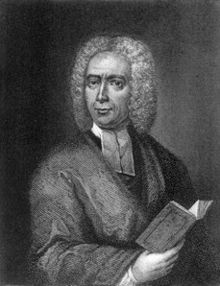 Isaac Watts was born in July of 1674 in Southampton, England. His father, Isaac, was imprisoned at the time of his birth for his being a deacon of a dissenting church. Because of their non-conformity Watts was never able to attend the prolific Oxford or Cambridge but instead attended the Dissenting Academy of Stoke Newington.
Isaac Watts was born in July of 1674 in Southampton, England. His father, Isaac, was imprisoned at the time of his birth for his being a deacon of a dissenting church. Because of their non-conformity Watts was never able to attend the prolific Oxford or Cambridge but instead attended the Dissenting Academy of Stoke Newington.
After his education Watts took up a pastorate of a large independent chapel in London. John Owen had previously ministered in the church Watts now pastored. During this season of his life his intense study and dedication to the pastorate led him to have frequent attacks of illness. Within his first couple years Watts had to have a co-pastor (Samuel Price) assist him in his duties. Though often ill—and often having misgivings about taking a salary—Isaac Watts’ congregation refused to break their connection.
Watts finally succumbed to illness in 1748 dying in Stoke Newington at the house of the beloved Sir Thomas Abney family.
Why You Should Know Him:
Even if you do not know Watts you have more than likely read some of his hymns. He was one of the most popular writers of his day for his hymns. But he also was very popular for his catechism and his Scripture History—these were standard works for years. Even his books on philosophy were often used as textbooks. Watts, however, is most known today for his hymn writing.
Watts broke the mold of the day by introducing new poetry and new songs and hymns of spiritual worship. Previously churches would only sing hymns or other poetry found in the Scriptures. Watts’ use of extra-biblical poetry opened up the door for the hymns and songs we now sing in our churches.
Some of Watts’ more famous hymns include:
When I Survey the Wondrous Cross
Alas! And Did My Savior Bleed
Joy to the world
This is the Day the Lord Has Made
These are only four of over 500 hymns that Watts composed. You can read all of these hymns here. Watts’ poetry and hymn writing is very rich, God-centered, drenched in the gospel, and Christ-focused. It is worth noting that John Newton was very much influenced by the hymns of Watts. His mother would sing them to a young Newton and many believe that these seeds of truth were instrumental in Newton’s later conversion. Certainly, it influenced Newton’s own hymn writing.
Samples:
I gave you this last week but it fits here as well. This is classic Watts:
Hast thou not seen, impatient boy!
Hast thou not read the solemn truth,
That gray experience writes for giddy youth
On every mortal joy?
Pleasure must be dash’d with pain:
And yet with heedless haste,
The thirsty boy repeats the taste,
Nor hearkens to despair, but tries the bowl again.
The rills of pleasure never run sincere,
(Earth has no unpolluted spring)
From the curs’d soil some dangerous taint they bear;
So roses grow on thorns, and honey wears a sting
In vain we seek a Heaven below the sky;
The world has false, but flattering, charms;
Its distant joys show big in our esteem,
But lessen still as they draw near the eye;
In our embrace the visions die,
And when we grasp the airy forms
We lose the pleasing dream.
Earth with her scenes of gay delight,
Is but a landscape rudely drawn,
With glaring colors, and false light;
Distance commends it to the sight,
For fools gaze upon;
But bring the nauseous daubing night
Course and confus’d the hideous figures lie,
Dissolve the pleasure, and offend the eye.
Look up, my soul, pant toward th’ eternal hills;
Those Heavens are fairer than they seem;
There pleasures all sincere glide on in crystal rills,
There not a dreg of guilt defiles,
Nor grief disturbs the stream.
That Cannan knows no noxious thing,
No cursed soil, no tainted spring,
Nor roses grow on throns, nor honey wears a sting.
(Isaac Watts, Earth and Heaven)
Further Study:
Psalms and Hymns of Isaac Watts
A search for Isaac Watts on Google Books will give you a few very helpful books for free. Some by Watts and a few biographies from others.
Watts was more than just a hymn writer he was also a physician of the soul. Check out his counsel to those going through spiritual ups and downs.